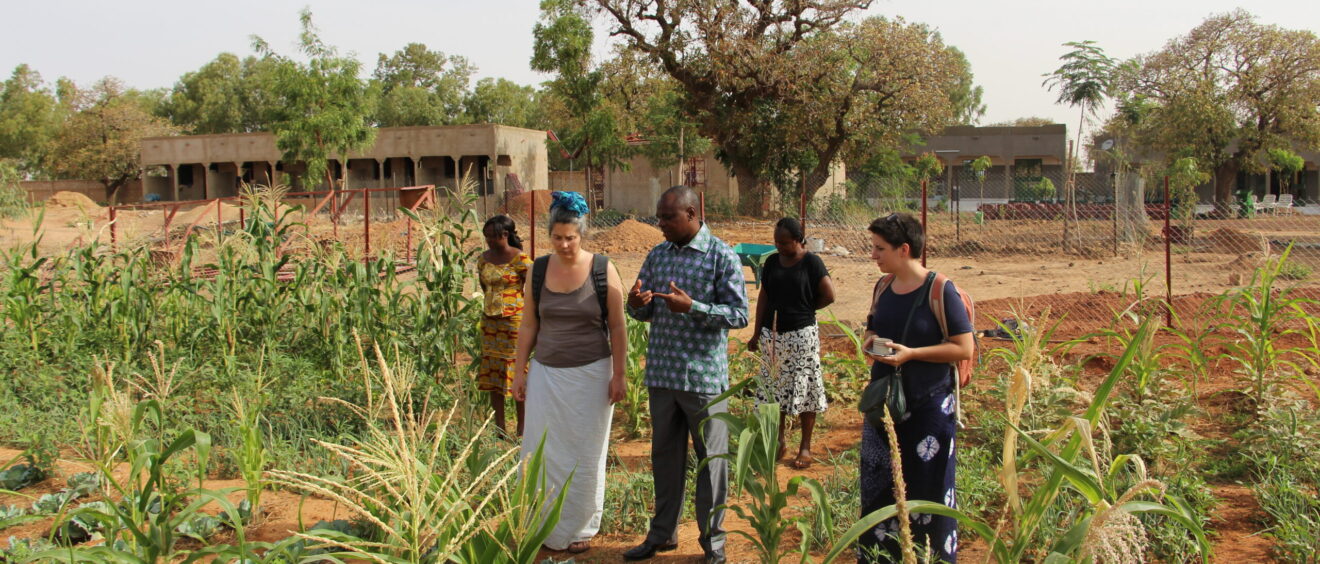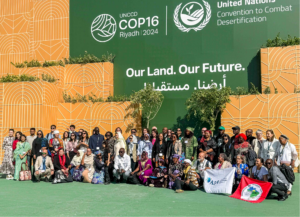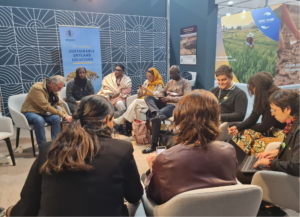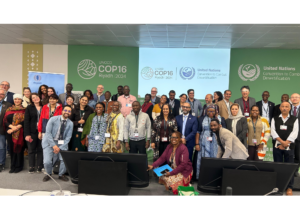
Collective action to combat land degradation, desertification and drought
Drynet at the UNCCD Conference
Every year, the planet loses some 100 million hectares of healthy, productive land. Land degradation, desertification and drought are affecting the lives of hundreds of millions of people, exacerbating hunger and poverty worldwide. The impacts often fall hardest on those most likely to be excluded from decision-making, including women, youth, small-scale farmers, pastoralists and Indigenous Peoples.
It’s problems like these that make a strong civil society indispensable. Civil society organisations (CSOs) see the impacts of such problems first-hand. They work directly with affected communities to develop and implement locally-led solutions. Their insights and recommendations are crucial for the development of effective policies at all levels, from the local to the global.
DRYNET: AMPLIFYING VOICES FROM DRYLANDS
Both ENDS is committed to supporting civil society organisations to influence decision-making and advance environmental justice, including by building strong networks. Since 2007, we have joined forces with partners from all over the world as part of the Drynet network. Drynet insists that to effectively counter land degradation, local organisations and communities living in drylands must be at the heart of the solution. By directly linking local groups with policy makers and engaging them in broader debates, Drynet aims to ensure that their voices are heard in important decision-making processes.
Drynet has proven its worth as an organising force in the processes of the United Nations Convention to Combat Desertification (UNCCD), among other forums. The UNCCD is an important international policymaking space, as its decisions help shape national policies on land use. It is also an important space for civil society organisations to develop relationships and credibility among national policymakers. CSOs are often taken more seriously in their own national contexts, and invited to contribute to the development and implementation of national polices, as a result of their participation in collective advocacy at UNCCD meetings.
In 2024, Both ENDS was pleased to join other Drynet members at the UNCCD COP16, in Riyadh, Saudi Arabia. Together, we presented ten detailed recommendations to UNCCD decision-makers. Among other things, we called for robust implementation of the UNCCD’s landmark decision recognising informal, collective and customary land tenure; increased support for people-centred drought management strategies; and targeted policies and programmes for sustainable and inclusive rangeland management.
WOMEN-LED INITIATIVES AND WOMEN’S LAND RIGHTS ESSENTIAL
Women’s efforts to restore and care for land are essential for achieving Land Degradation Neutrality (LDN), a key goal of the UNCCD. Strengthening land rights – particularly women’s land rights – and support for women-led action on land degradation is a top priority for Both ENDS. We are active in the UNCCD Gender Caucus, where we contribute to key publications and strategies, and support activities aimed at raising the profile of gender-responsive land management and women’s rights to land. We also participate in the Women’s Land Rights Initiative, organised by TMG Think Tank for Sustainability and Robert Bosch Stiftung, which aims to strengthen women’s land rights not only in the UNCCD, but also in the UN Conventions on Biodiversity (UNCBD) and climate change (UNFCCC).
At COP16, we co-organised a side event, together with the Robert Bosch Stiftung and Landesa, focused on unlocking finance for women-led initiatives. Moderated by Both ENDS, the session underscored the need to make finance more accessible for women’s organisations. The session triggered valuable discussion and insights about how ‘impact’ is defined and measured, and the implications for funding of women-led initiatives.
ENHANCING THE ROLE OF CIVIL SOCIETY IN ENDING LAND DEGRADATION
Together with our colleagues in Drynet, Both ENDS has worked for decades to develop CSO capacity to influence policy and secure funding for locally-led initiatives for sustainable land use and restoration. In all of our work, Both ENDS highlights the value and effectiveness of local leadership and knowledge. During the COP16 panel discussion, ‘Can Science Better Inform and Shape Solutions?’, organised as part of the UNCCD Science Policy Interface, we emphasised the need for co-creation of knowledge through collaboration between scientists and local groups, including women, youth, farmers, pastoralists and Indigenous communities. Another session, co-organised with TMG Think Tank for Sustainability, focused on enhancing civil society participation in the UNCCD. Together with some 30 participants, we discussed mechanisms to enhance dialogue and joint strategising among CSOs engaged in the UNCCD, as well as opportunities to foster engagement between local civil society and national policymakers on desertification and land degradation issues.
With a large contingent of the Drynet network in attendance, COP16 also provided the perfect moment to embark on a new journey together. We were thrilled to launch an exciting new three-year project, ‘Strengthening Civil Society Role in Achieving Land Degradation Neutrality’. Supported by the Global Environment Facility (GEF), the new project is a collaboration between Both ENDS, Drynet, and the International Union for Conservation of Nature (IUCN) to develop civil society organisations’ knowledge and capacities on the UNCCD and LDN, support their participation in key UNCCD international events, improve their access to funding for LDN, and strengthen communications and outreach, including by sharing stories of successful locally-led initiatives and actions for LDN.
The new project – as well as the outcomes of COP16 – confirm the power and promise of the Drynet network. Thanks to our collective efforts, civil society voices, especially those of organisations working directly with local groups who are directly impacted by land degradation, desertification and drought, are being heard at the highest levels of global policymaking. In response to our call, policymakers are increasing investment in land restoration initiatives and recognising agroecology as a viable, sustainable land management approach, an important step in the right direction.

All CSO representatives at UNCCD COP16. Photo by IISD

Drynet members strategizing together during the UNCCD COP 16. Photo by CARI

Celebrating the launch of our new three-year project, ‘Strengthening Civil Society Role in Achieving Land Degradation Neutrality’, supported by the Global Environment Facility (GEF). Photo by IUCN
